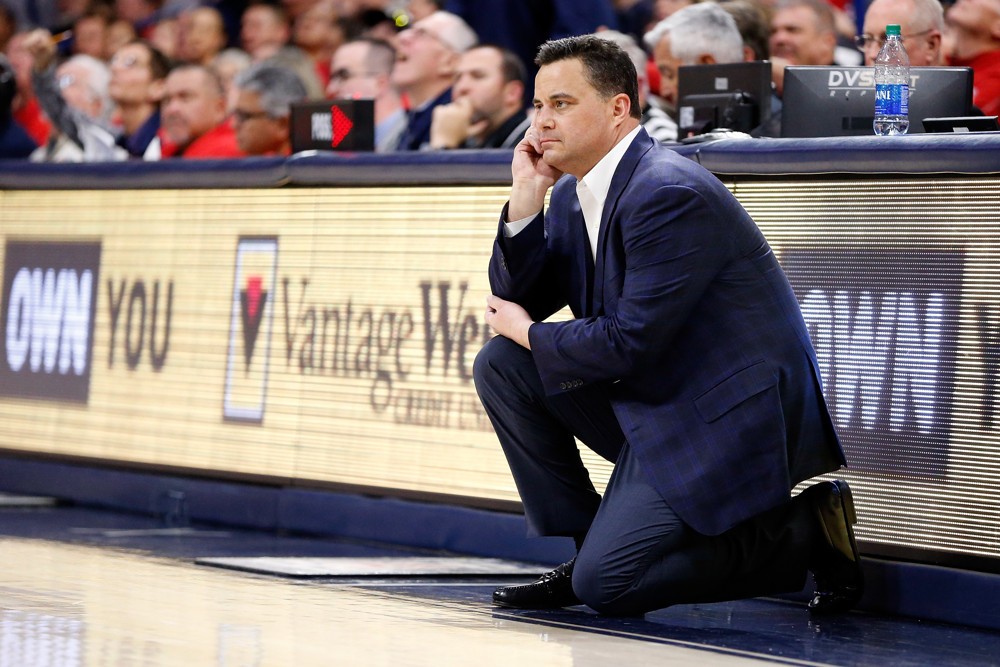Monday night, Arizona improved to 7-1 after pounding Colorado 88-74. Five Wildcats finished in double figures, highlighted by Georgetown transfer James Akinjo going for 22 points and eight assists.
Less than 24 hours later, the school announced it is applying a self-imposed postseason ban for the 2020-21 season, ending its hopes of winning a March Madness contest for the first time since 2017.
—BracketMatrix: Missouri surges
—Harkins 25: Tennessee rolling, Michigan undefeated
—SUBSCRIBE to ![]() today!
today!
Arizona’s decision is the second major self-imposed ban in as many months in college basketball. Auburn announced in late November that it would ban itself from the 2021 postseason, also stemming from complications in the 2017 FBI investigation into recruiting bribery charges. Auburn’s ban came just hours before the Tigers’ season opener against Saint Joseph’s on Nov. 26. Bruce Pearl’s team had won 81 games over the previous three years.
Now we fast forward to today — more than a month into the season — where Arizona has played about 30 percent of its 2020-21 schedule. March 6’s home matchup vs. Arizona State will mark the end of the ’20-21 season for these Wildcat players who were once sold on competing for Pac-12 titles and March Madness runs. Did Sean Miller’s staff warn their 10 newcomers — seven of whom are foreigners — during recruitment that this decision was a possibility?
Although the COVID-19 blanket eligibility waiver will allow seniors a chance to return next fall, it doesn’t change the fact that midseason self-imposed bans are flat-out wrong.
Rick Pitino’s Louisville Cardinals pulled a similar stunt during a Friday news dump back on Feb. 5, 2016. At the time of the announcement, Louisville was ranked 19th in the AP poll with an 18-4 record, sitting 8th in KenPom with a potential Final Four run ahead. The team’s top two scorers — Damion Lee and Trey Lewis — were seniors, and their careers ended with a 22-point blowout loss to Virginia in a meaningless regular-season finale. Both players began at the mid-major level and transferred in hopes of competing in March Madness. They found out about the ban about an hour before the news was made public.
The circumstances are different with Arizona, though the larger point still stands: There should be a hard offseason deadline in college basketball for all of these matters.
A cutoff date, possibly a month before a season’s opening day, would prevent players from being blindsided later in the year. Most D-I athletes don’t play in the NBA, and the pinnacle of their basketball career is participating in conference tournaments and March Madness.
Awareness of these bans beforehand would at least allow the players to explore other opportunities before their eligibility expires. If you want to self impose a ban for the following season, fine, but doing so in the thick of a conference race entirely opposes the NCAA’s mission statement of a “fair shot” for all student-athletes as well as “respect, integrity and responsibility.” But I suppose respect, integrity and responsibility aren’t synonymous with a program accused of nine counts of NCAA misconduct, including five Level I violations and lack of institutional control.
We all know that Arizona is self imposing this ban in hopes that the NCAA doesn’t drop the hammer as hard. But players always take the brunt of these actions and, in this case, know the rest of their season is nothing more than glorified scrimmages in empty arenas.

You must be logged in to post a comment.